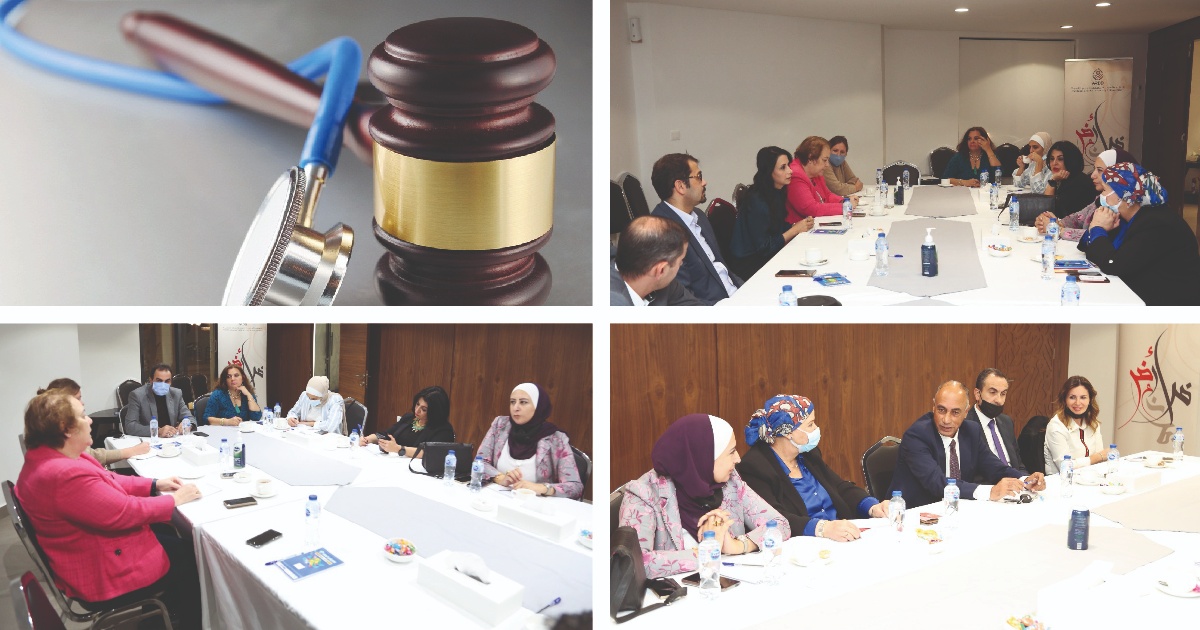In light of reported medical errors and the slow progress in activating the Medical Liability Law in Jordan, and focusing on the right to health as an inalienable human right, and on the need for a comprehensive health system The Justice Sector Forum held a session in October 2021 to discuss medical accountability and legal protection frameworks.
A “Public Health Policy Lab” emerged from this session, tasked with following up on the forum’s recommendations and aspirations in this regard, and with standardizing legal and health aspects.
The committee, which includes representatives and activists from the legal and medical sector, met twice, on November 7 and 28, 2021, to consult and discuss the next steps and work strategy.
The committee members are: Executive Director of the Arab Renaissance for Democracy and Development (ARDD) Samar Muhareb, President of the Jordan Paramedic Society Yanal Al-Ajlouni, founder and advisor of Durrat Al-Manal for Development and Training Dr. Sawsan Al-Majali, Secretary General of the Health Coalition for Patient Protection Dr. Fadia Samara, former member of the Jordan Medical Association Dr. Tariq Al-Tamimi, Dr. Anas Al Mohtaseb, Dr. Aseel Al-Jallad, former judges and legal experts Jihad Al-Daridi and Muhammad Al-Tarawneh, legal expert and councilor at the National Center for Human Rights Nisreen Zureikat, lawyer Ramy Qwaider, media professional Tahani Rawhi, and a representative of the Jordanian Association for Medical Aid for Palestinians.
The committee’s meetings aim to enhance and structure the current conversations on public health between stakeholders in Jordan (health services providers, clients, and others) on issues of access and accountability in relation to public health in Jordan.
It will hold meetings and sessions with governmental and non-governmental health sector stakeholders to come up with a policy paper and submit it to decision makers, with the aim of contributing to enhancing the efficiency of health care and protection systems in Jordan.
In its first two meetings, the committee focused on the importance of and need for a comprehensive health system, the right to health care, with the need to reinforce and emphasize this matter in school curricula, and the importance of discussing the Medical Liability Law after reviewing and understanding it, and getting acquainted with the latest developments and what has been accomplished in the provisions of the law, by discussing it with stakeholders.
The committee members stressed the importance of having statistics on health cases in courts, since there are no studies and other sources of reference in this regard. The greatest focus, however, was on the importance of activating and supporting the Medical Malpractice Insurance Fund. If activating this fund is the government’s responsibility, supporting it is a joint responsibility of government and institutions.
Committee members agreed on the important the role the local civil society organizations and INGOs can play in training and rehabilitation in the field of mental health. They also discussed the cooperation of Ministry of Health cadres and how civil society organizations are allowed to deal with it, the lack of access of Jordanian citizens to mental health services, compared to refugees in Jordan, in addition to the need to be aware of the meaning of “the right to health” as stipulated in the constitution, and to get to know the details of the Medical Liability Law so that members of the committee can discuss and delve into it with understanding and knowledge.
The committee is committed to getting to understand the law thoroughly before issuing its recommendations. It will consult all those who have a say in the matter, to gain more knowledge, and will strive to effect change and have a positive influence on the issue.


